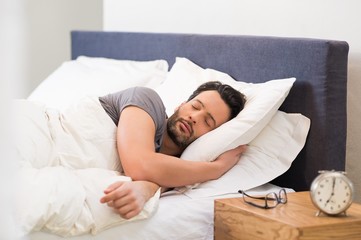Table of Contents
Sleep Apnea and Mental Health
 Sleep apnea can occur when breathing is disrupted while sleeping. There are varying types of sleep apnea: Central sleep apnea occurs when the brain fails to send signals to muscles that regulate and initiate breathing. Obstructive sleep apnea happens when throat muscles relax, and air fails to flow in and out through the nose and mouth; this type is more common. Complex sleep apnea syndrome happens when the patient suffers both central and obstructive sleep apnea. The individual may not even be aware that there is an issue, as the body will resume breathing while he or she is still sleeping. This may sound normal, but it can result in fatigue during the day.
Sleep apnea can occur when breathing is disrupted while sleeping. There are varying types of sleep apnea: Central sleep apnea occurs when the brain fails to send signals to muscles that regulate and initiate breathing. Obstructive sleep apnea happens when throat muscles relax, and air fails to flow in and out through the nose and mouth; this type is more common. Complex sleep apnea syndrome happens when the patient suffers both central and obstructive sleep apnea. The individual may not even be aware that there is an issue, as the body will resume breathing while he or she is still sleeping. This may sound normal, but it can result in fatigue during the day.
Causes
A small airway or other structural problem may cause challenges in breathing while sleeping; relaxed tongue and throat muscles can obstruct the airway opening. The muscles of the soft palate at the bottom of the tongue and the uvula (the fleshy tissue dangling from the center of the back of the throat) relax and sag, thereby blocking the airway. Obesity also contributes, with tissue narrowing the airway, hindering airflow through the nose or mouth.
Treatment
The individual will need to see their basic care physician, and in some instance’s pulmonologists, neurologists, or others with specialize in sleep disorders may be consulted for diagnosis and treatment. Medical history and a physical exam are likely required.
 There can be various reasons for disturbed sleep, making the diagnosis of sleep apnea fundamentally complicated. The physician may evaluate the patient through testing, which can be held in a sleep center. However, there are easy home sleep tests that measure heart rate, blood oxygen level, airflow, and breathing patterns as well.
There can be various reasons for disturbed sleep, making the diagnosis of sleep apnea fundamentally complicated. The physician may evaluate the patient through testing, which can be held in a sleep center. However, there are easy home sleep tests that measure heart rate, blood oxygen level, airflow, and breathing patterns as well.
The polysomnography evaluation records body function during sleep, including electrical activity in the brain, muscle activity, heart rate, breathing, airflow, blood oxygen, and eye movement. Such a test should diagnose sleep apnea and show the severity of the problem.
The time it takes for a patient to fall asleep is estimated through the multiple sleep latency test. People suffering from interrupted sleep take an average of 10 to 20 minutes to fall asleep. This test also evaluates the degree of excessive daytime sleepiness a person might have, and it is useful in ruling out other disorders as well.
In minor cases, prescribing the person to sleep on his or her side might be all that is needed. If nasal congestion is a problem, a decongestant may be prescribed.



 Shop
Shop



